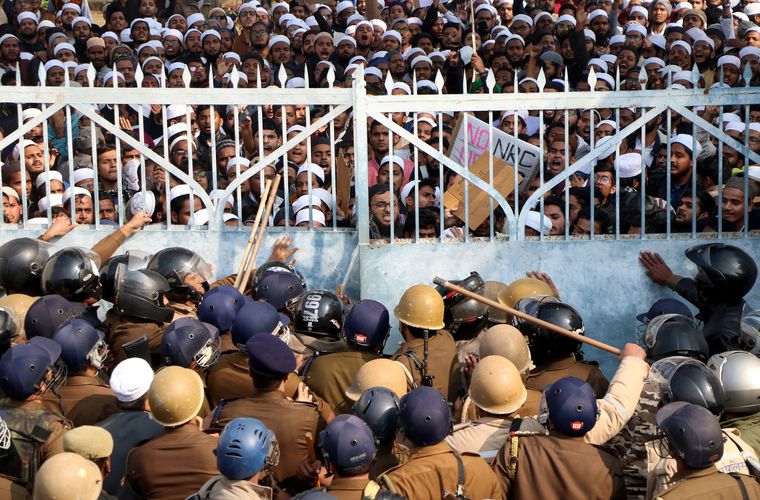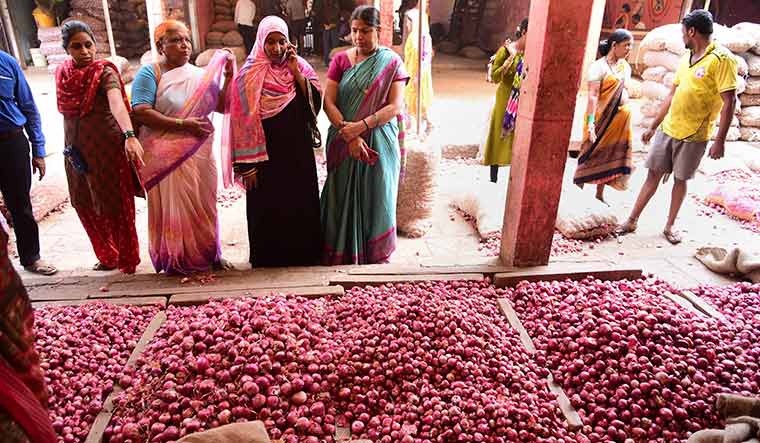Former Union minister and senior Congress leader P. Chidambaram is in a combative mood. Speaking exclusively to THE WEEK, Chidambaram said the Narendra Modi government had put the economy in an ICU. He alleged that the government was helping only its cronies, and that it had nothing but contempt for the poor and the middle class.
Chidambaram called the Citizenship Amendment Act religion-based discrimination, and expressed hope that it would be struck down by court. He said the government was attempting to alter the Constitution and was pushing its agenda of hindurashtra. The veteran leader, who is out on bail after spending 106 days in jail in the INX Media case, declined to answer questions regarding the time he spent in jail, but reiterated that he had emerged stronger from the experience.
Excerpts from the interview:
Q/ What makes you confident that the Citizenship (Amendment) Act will be struck down by court?
A/ Article 14 is now well interpreted and has been expanded by the Supreme Court. It allows reasonable classification which has a nexus to the object, but also prohibits what is called under-inclusiveness. Birds of the same feather must flock together. You cannot leave out some birds and add strange birds. You cannot pick three neighbouring countries and leave out other neighbouring countries. You cannot pick six communities and leave out other communities.
Look at the absurdity of the situation. Hindus are included, but Sri Lankan Hindus are excluded. Christians are included, while Bhutanese Christians are excluded. The net result of the NRC-CAA exercise is that all other migrants except Muslims will cease to be illegal migrants. This is patently religion-based discrimination, which is why many of us are confident that this will be struck down.
Q/ Political motives have been attributed to the government for bringing the amendment.
A/ Of course. This is pushing the hindutva agenda. Since they came to power again, their entire focus has been the hindutva agenda. They started with the triple talaq bill, then Article 370, then the NRC exercise and now the CAA. Are these the priorities of the country? No. But these are the priorities of the BJP-RSS. Clearly, an attempt is being made to quicken the pace of pushing the hindurashtra agenda.
Q/ How do you look at the argument that specifying exceptions on the basis of religion was made necessary because of the legacy of partition?
A/ There are no legacy issues. Partition took place 72 years ago. In fact, the legacy issues were addressed once in 1948 with the cut-off date and once again in 1971 with the Assam Accord. If you can stop more people from coming, do that. But the people who have come are here. And, they are here with a story. Now, you are asking them to change the whole story. Many of them had said they were born here. Many of them had said they were born to parents who were born here. Now, you are asking them to say a completely different story that ‘we were persecuted in such and such village, in such and such town and in such and such year on religious grounds, and therefore, we came here.’ Now, obviously, one story is a lie and the other is the truth. Why are you making people change their story now?
Q/ Do you feel the Constitution is under threat?
A/ It is under threat. The Indian Constitution, like any other modern, liberal Constitution is not based on religion. There are very few countries which are theocratic states, based on a religion, where citizenship is also given on the basis of religion. The best example is Israel. Ours is based on the territoriality principle. Whoever is found in the territory of India is an Indian citizen. If you now introduce a principle of religion, as the United Nations Human Rights Commission has condemned it, this is against the basic tenets of a modern democracy. They are clearly attempting to change the Constitution. They do not have two-thirds majority to amend the Constitution. Therefore, they are amending the Citizenship Act. If they have the power, they will amend the Constitution.
Q/ Many parties such as the JD(U), BJD, AIADMK and the YSR Congress voted in favour of the amendment.
A/ Many of them are confused. Many of them do not know whether they should be liberal or conservative. Many of them do not know whether they should be forward looking or backward looking. Many of them want to be modern and appeal to the young, but they are pulled back either by the fear of losing power or by victimisation by the Centre.
It is unfortunate that although these parties are led by educated people like Naveen Patnaik and Nitish Kumar, they are taking a completely regressive, reactionary position on the amendment to the Citizenship Act.
Q/ Will you be arguing in court against the amendment?
A/ Many will argue. If I get a chance, I will. But there are many eminent, qualified lawyers who can argue this case.
Q/ How do you look at the results of the recent Assembly elections?
A/ In Haryana, they were expecting 50 seats, they got 31. In Maharashtra, they expected 150 and thought they would be able to form a government on their own. They got 105. In Haryana, they were dented. In Maharashtra, they were denied power. And I am sure, in another election, they will be defeated.
Q/ Do you think the Congress will be able to work with the Shiv Sena, as the two parties are poles apart ideologically?
A/ As long as we can, why not? The Shiv Sena, for example, is in the same position as the DMK was in 1957. If it has exhibited an interest to mainstream itself, why not welcome it? As long as the Shiv Sena mainstreams itself and sticks to the common minimum programme, there is no reason why the NCP and the Congress cannot work together with it.
Q/ Was the Congress disappointed with the Shiv Sena’s stand on the CAA?
A/ No. The Shiv Sena changed its stand between the Lok Sabha and the Rajya Sabha, and I welcomed it. A party that is mainstreaming itself cannot do it overnight. It will take time.
Q/ How do you look at the situation in Jammu and Kashmir? Union Home Minister Amit Shah said not a single person was killed in police firing since the nullification of Article 370.
A/ Does the home minister of India count law and order success based on the number of dead bodies? They have put a lid over Jammu and Kashmir and they have allowed the Army to occupy it. That does not mean there is no ferment. That does not mean that the valley is not simmering. I speak to friends in Jammu and Kashmir. It is a volcano that will burst any time. I hope it does not burst. But if you keep the lid on it and put an Army on top of it, it is bound to burst. I am very worried about Jammu and Kashmir.
Q/ What steps need to be done to alleviate the fears with regard to Jammu and Kashmir?
A/ This is a democracy. You have to talk to people. You have to understand their anxieties, fears, expectations and aspirations. Is not Jammu and Kashmir today virtually an occupied state? How long can you keep it as an occupied state? I can understand if you put these controls for a few days. But it has been on since August 4. And people are detained without charges. The Supreme Court will deliver its judgment in the next couple of weeks, so I shall not speak more about it.
Q/ Do you plan to visit Jammu and Kashmir any time soon?
A/ I want to. I spoke to friends. But they say it is very, very cold and have advised me to visit only by the end of January or early February.
Q/ There is nationwide outrage over incidents of rape. Why do you think such crimes continue unabated?
A/ It is because of a sense of impunity which is encouraged by the utter callousness of the national leadership. The prime minister does not make a statement. The entire cabinet does not speak in one voice. Even today, and this is shameful, even today there are ministers and MPs who speak in a language that is completely anathema in a modern, liberal society. This has given a sense of impunity to the perpetrators. And, that is worrying.
Q/ How do you look at the widespread support for the encounter killing of the accused in the Hyderabad rape incident?
A/ It is not support for the encounter. It is actually anger against the system that does not deliver justice. That anger has to find an outlet. And, the outlet is that if the established system does not deliver justice, at least this way we can get justice. It may or may not be right in this case. But it can go horribly wrong in another case. In another case, an innocent man could be lynched or could be killed in an encounter. That would be horribly wrong.
Q/ On economy, how bad do you think the situation is because the government is claiming there are signs of recovery?
A/ The situation is as bad as Dr Arvind Subramanian has put it, that it is in the ICU. A former chief economic adviser, who left the government about a year ago, says that the issues that he had flagged have not been addressed completely, and today the slowdown is setting in deeper and deeper, and the Indian economy is in the ICU. What more condemnation do you require of this government?
Q/ The government has taken certain measures, including the removal of corporate tax, funds for the realty sector and recapitalisation of private sector banks. Is this enough?
A/ They have taken measures to help their cronies. This was not the time to help the corporates. This was a time to help the people who have lost wages, lost jobs, have lower incomes and lower producer prices. It was a time to help the bottom 25-35 per cent of the working class. They have left them to fend for themselves. The only class they have helped is the 800-odd corporates to whom they gave a corporate tax cut worth about Rs1.5 lakh crore, which itself is money they raised by raiding the treasury of the RBI.
Q/ What needs to be done to boost demand, since that is at the centre of the present crisis?
A/ The best thing that they can do is resign. Since they will not, the next best thing they can do is to hire some talent. At least, hired talent will tell you what the problem is. I think this government is completely clueless about the diagnosis of the problem. It is addressing the wrong issues. It is cutting the wrong taxes.
Q/ The price of onion has become a symbol of the present economic crisis.
A/ Of course. But the finance minister says, “We do not eat onions in our house.” This shows the mindset of this government and its utter contempt for the poor and the middle class. I was told that the very poor in north India eat only roti, onion and salt on most days. And then you turn around and say, “We do not eat onions in our house.” I do not have to make any further comment.
Q/ How would you describe the 106 days you spent in jail?
A/ I decline to answer any questions regarding that. But I have said that if you sleep on a wooden cot with just a sheet on it, without a pillow, it strengthens your back, your spine and your neck.




